
Mounting the Control Unit
The control unit must only be mounted in the interior of the vehicle. Do not mount the
main unit in the engine compartment. Choose a mounting location that will not be easily
accessible to a thief, and will not interfere with the operation of any vehicle components
such as foot pedals, steering column, air vents, seat rails, etc.
Do not mount the control unit until after setting the internal jumpers and performing a
complete operation check of the system. After installation is complete and performance
verified, the control unit can be easily mounted using wire ties through the mounting tabs
on the bottom of the unit.
Mounting the Siren
Choose a siren mounting location that is away from heat sources such as exhaust manifolds,
and where it cannot be easily accessed from underneath the vehicle. Be sure to face the
siren downward to prevent the collection of water in the siren’s housing.
Always route all wires from the engine compartment into the interior of the vehicle through
a proper grommet.
Mounting the Shock Sensor
Choose a suitable interior mounting location for the shock sensor that provides ample
coverage of the vehicle. Keep the sensor away from the vehicle’s ECM or other sources of
electrical interference. Suggested mounting locations include air conditioning ducts,
dashboard braces, or center console supports.
During proper operation, the shock sensor will detect impacts to the vehicle only and will
not usually be triggered by slow rocking movements of the vehicle like those caused by
wind.
Page 12 - Galaxy 3000 Plus
Summary of Contents for Galaxy 3000Plus Series
Page 1: ...3 30 00 00 0P PL LU US S S SE ER RI IE ES S VEHICLE SECURITY SYSTEM PRODUCT MANUAL...
Page 2: ......
Page 4: ......
Page 14: ...Page 10 Galaxy 3000 Plus...












































